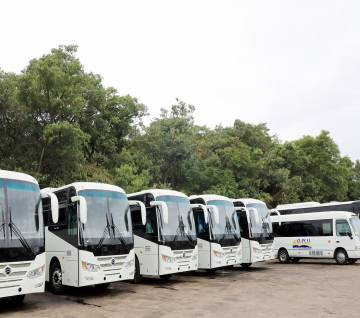ED sees end to commuter woes. . .Zupco buses arrive

Farirai Machivenyika , Harare Bureau
PRESIDENT Mnangagwa yesterday commissioned 39 of 300 buses Government has secured as part of measures to address the plight of commuters that are being ripped off by unscrupulous private operators.
The 300 buses are part of an overall Government policy to revamp the sector and introduce a mass transport system, with a further 500 buses from Belarus soon to be availed.
The commissioning of the buses in Harare yesterday coincided with the launch of a computerised system that will be installed in the buses, designed by Dr Talon Garikayi, the director of Technology Transfer at the Harare Institute of Technology (HIT).
The system can be used for issuing fuel, monitoring its consumption, tracking, real time financial reporting among others.
The agreement for the supply of the 500 buses was reached when the President visited Belarus as part of his Eurasian tour in January.
“When I went away to visit Russia, Belarus, Azerbaijan and Kazakhstan in January, one of the issues I came back and stated to the nation was that we had arranged to acquire 500 buses from the Republic of Belarus,” President Mnangagwa said as he launched the buses.
“But by the time I came, there had been some incidences and there had been some violence and during the course of the disturbances, fares charged by commuter omnibuses went up so rapidly that our community of commuters was affected greatly.”
The President said Government then decided to procure the 300 buses in the short term to address the plight of commuters.
“So, we decided that it was necessary to have a stable transport system both in the urban and countryside. But because the arrangements we had made in Europe would take longer, we decided to make preliminary arrangements which would bring about 300 buses before the 500 come from Europe.

President Mnangagwa commissions the newly acquired Zupco buses in Belvedere, Harare, yesterday. — (Picture by Tawanda Mudimu)
“This 300-200 are from South Africa and 100 from China and these began coming into the country a few days ago and on a daily basis they are arriving. Some arrived yesterday (Monday), some tomorrow (today) and so on, but we believe that by month end, all the 300 buses will be in Harare. This consignment is now ready to be put into operation,” he said.
President Mnangagwa said Government was committed to providing a modern and decent transport system to the commuting public.
“Government thinks it is necessary to provide a transport safety net that will protect the public from unscrupulous public transport and kombi operators by providing a modern, decent and digital transport system.
“Today we are seeing the launch of that concept, the realisation and actualisation of that concept,” he said.
President Mnangagwa said the current transport system was riddled with many challenges for commuters that include high fares and high accident rates among others.
Speaking on the digital system to be installed in the buses, the President said it would eliminate thieves and cheats that were ripping off the public.
“We are grateful that a new system has been introduced by HIT where all these malpractices will be eliminated,” President Mnangagwa said.
“This system is an innovation by our boys and girls. We don’t need any MoUs or MoAs. It’s manufactured here locally by our children. This means the authorities will able to track where the bus is and the funds that have come in. This technology gives us the possibility to install it in other Government systems like at CMED where we are having problems with thefts, abuse of fuel and motor vehicles. I am happy that all this will come to an end.”
He said the technology would further enhance the achievement of targets set under Vision 2030.
Under the Transitional Stabilisation Programme (TSP), mass transport is cited as a key enabler of the economic turnaround.
“An efficient and adequate transport system is critical for the development of the country, providing access to markets including reducing regional disparities.
“The road, rail and air sub-sectors are critical in rapid industrialisation and agricultural advancement as they facilitate trade and movement of goods and people, hence the need to rehabilitate and upgrade the current stock of assets,” says TSP.











Comments